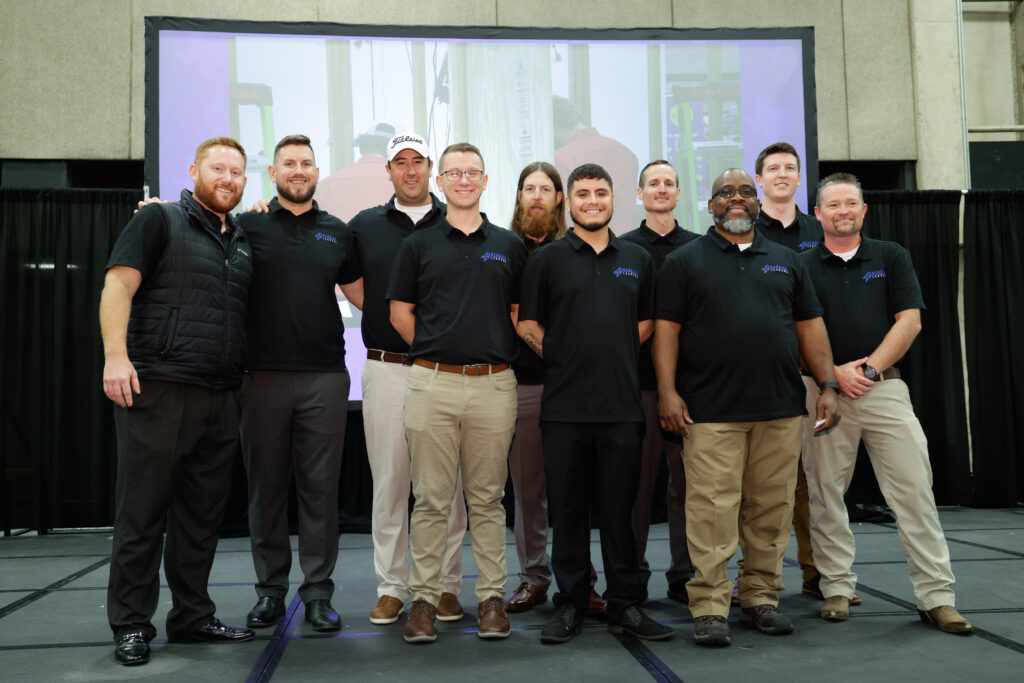By IEC Staff
The IEC Emerging Leaders Program is a six-month leadership development experience for professionals in the electrical and systems contracting industry. Each year, six to ten individuals are selected to form a cohort class that participates in skills development workshops, networking opportunities, leadership exercises, and project development experiences. The culmination of the experience is presentation of their industry impact project at SPARK.
In 2023, 10 individuals tackled workplace issues faced by every IEC member — company culture, employee retention, and positive culture in the IEC Apprenticeship Program. Details on each of these three portions of the industry impact project are below.
Company Culture
Erik Brandenburg, lead technical supervisor for Golka Electric, Mesa, AZ, was project lead for the company culture aspect of the IEC Emerging Leaders industry impact project. Erik’s teammates on this portion were Tiler Cross of Davis H. Elliot Company, Lexington, KY; James Mattingly of Corrigan Electric, Louisville, KY; and Matthew Oleson of Current Connections, Inc. West Palm Beach, FL.
Erik is passionate about building and nurturing the proper culture that makes people want to be at work and perform at their highest level.
 “To me, it’s like the environment, it’s like soil,” he says. “You have to tend the soil. You could have the best seeds in the world but if you’re putting them in bad dirt, they’re not going to grow. Every one of our contractors sends their guys to school but they can’t think ‘hey, I put this seed in the dirt, I put this guy in school and four years later I have a journeyman.’”
“To me, it’s like the environment, it’s like soil,” he says. “You have to tend the soil. You could have the best seeds in the world but if you’re putting them in bad dirt, they’re not going to grow. Every one of our contractors sends their guys to school but they can’t think ‘hey, I put this seed in the dirt, I put this guy in school and four years later I have a journeyman.’”
Erik says you have to check in, you have to do your own training, you have to set the right conditions. You have to put them next to the right other person so that they can grow properly. You have to have free and open dialogue so you know and understand what each employee needs and expects and offers. And, you have to check in regularly — it’s not a one and done exercise.
That is why this Emerging Leaders team created a survey tool to help company owners assess how well their messages are being understood by their employees. The team began by talking with company owners in their respective geographical areas — about 20 companies in total. This helped the team identify the issues to address in survey questions. They developed a company culture survey handbook as well as instructional tutorials — in both .pdf and video form — to help IEC owners set up their own survey in Google forms for free and easy distribution.
The survey handbook includes questions developed for management and for employees on company culture which allow users to see if they are in sync.
Management Questions (6):
- I set clear expectations for my employees
- I prioritize praising my employees for their hard work
- I promote a culture that shows care for the individual, not just the worker
- I promote development in my employee’s careers
- I set a clear mission for my company and encourage commitment to quality work
- How often do you conduct an employee performance review?
Employee Questions (16):
- I know what is expected of me at work
- I have the materials, tools, and equipment to do my job correctly
- My company stays up to date with the latest tools and safety equipment
- My company provides me with an appropriate work-life balance
- At work, I have the opportunity to do what I do best every day
- I have received recognition or praise for doing good work in the last two weeks
- My supervisor, or someone at work, seems to care about me as a person
- There is someone at work who encourages my development
- My opinion seems to be valued at work
- The mission or purpose of my company makes me feel that my job is important
- My associates or fellow employees are committed to doing quality work
- Do you know your company’s mission statement?
- I have had opportunities at work to learn and grow outside of an apprenticeship program within the last year
- I am happy with my career path and promotion plan
- I find pride in the work I do
- How often are you given a formal review from a supervisor?
“Our survey allows owners to get a temperature check of where they are at and how their employees are feeling about coming to work,” Erik says. “People that are really into developing good company culture and really think it’s important to have a great culture are checking in every year to be sure what they’re doing is still engaging their employees. It is important to check in often to make sure you are still on track. There is no stigma here, there is no shame. You simply need to know where you are so you know how to properly inspire and motivate your people. They need to know you care about them as humans in addition to caring for them as employees.”
Erik stresses that establishing, validating, and communicating that what each employee does is valuable has always been important, but it is even more so with the newer workers entering the field.
“You don’t want to tell them they’re doing something because it’s their job,” he says. “They want to know that what they’re doing makes a difference.”
Employee Retention
Darren Jones, project manager / estimator for Ohio Valley Electric Electrical Services, Cincinnati, OH, and his teammates Scott Duckett of Dvorak LLC, Baltimore, MD, and JT Files of Williams Electric, Lufkin, TX, handled the employee retention part of the project.
“We began our industry impact project work by contacting companies outside of electrical contracting to identify strategies that could be utilized in our field to help with employee retention,” Darren notes. “After five or six calls, we quickly realized that companies with high retention rates and proven strategies keep those strategies close to the vest. We called an audible and decided to research the underlying issues within our industry to produce some retention strategies IEC members could implement at their companies through surveys.”
Those surveys produced some compelling — maybe even startling — information in addition to effective retention strategies. Regarding the current state of industry as reported by those responding to the survey:
- 20-30% turnover rate
- Average age of electricians – 41 years old
- 7,000 new electricians join the industry each year, but 10,000 retire from it
- Becoming more and more important to retain the employees you have
This shortage is supported by the recent IEC Workforce Development Institute report, Understanding the Barriers to Entry in the Electrical Trade, which cited U.S. Bureau of Labor Statistics saying an estimated 73,500 electrical job openings are projected year over year for the next 10 years — outpacing the supply. Just under 70% of the IEC electrical contractor members surveyed for this study feel the supply of electrical apprentices is NOT sufficient to support their businesses.
Darren mentions a stat from census.gov that their group came across during their research that he found startling — by 2034, for the first time in history since the beginning of the U.S. Census, there are going to be more people over the age of 65 than under the age of 18.
All the more reason, Darren says, why IEC companies have to do everything they can to retain their current employees.
The group found that employees leave for these reasons:
- Culture
- Growth potential within the company
- Not feeling appreciated
- Benefits / compensation
- Wellbeing and work life balance
 The contractors responding to the Emerging Leaders survey averaged an 83% retention rate at their companies. In total, 96% of them believe they are doing a good job retaining employees. Retention strategies believed to make the biggest impact focused on improving company culture, creating a family atmosphere, providing training, and offering competitive pay. While acknowledging that a good culture or family atmosphere could mean different things to different employees, one item was heard in almost every survey and every conversation held — employees want to be recognized for their contributions.
The contractors responding to the Emerging Leaders survey averaged an 83% retention rate at their companies. In total, 96% of them believe they are doing a good job retaining employees. Retention strategies believed to make the biggest impact focused on improving company culture, creating a family atmosphere, providing training, and offering competitive pay. While acknowledging that a good culture or family atmosphere could mean different things to different employees, one item was heard in almost every survey and every conversation held — employees want to be recognized for their contributions.
“One common denominator we heard from company to company is that finding the best way and right amount of time to recognize employees for their work is key to employee retention,” Darren says. “This doesn’t have to be a gift and, in fact, it might be different for different employees. One contractor I spoke with said their leadership tries to do or say something once every seven days to each employee to be sure employees know they are appreciated. Walk over and say thanks, acknowledge something on the job site — just do or say something.”
Why is retention important?
- Cost of employee turnover is high
- Lost productivity
- Employee burnout
- Lost tribal knowledge
- Cost of training a new employee and risk of mis-hire
“Increasing employee retention, even by a small amount, can have significant and meaningful time and cost savings for an organization,” Darren offers.
The Emerging Leaders offer these takeaways to the IEC membership:
- Hire the right employees the first time
- Identify perks and benefits your employees want
- Optimize employee onboarding for long-term success
- Offer clear career path with opportunities for growth
- Create and maintain a positive company culture
- Recognize employees for their work
Positive Culture in the IEC Apprenticeship Program
Taylor Hobbs, associate director for IEC Central Ohio, is project lead for this third and final section of the Emerging Leaders industry impact project. He worked with Zack Jarmon of IEC Ft. Worth / Tarrant County; and Jorge Murillo of Current Connections, Inc., West Palm Beach, FL.
They address culture, but with a slightly different twist — to motivate and energize the men and women who have challenged themselves to enter the IEC Apprenticeship Program. With two of the three members of this group working for IEC chapters, they were well-positioned to dig into this important topic.
The four-year curriculum is regarded as the best in the industry so Taylor, Zack, and Jorge knew they could build on that strength. The team decided to focus on culture, or as Taylor calls it, that ‘hot topic that a lot of people don’t want to discuss.’ They developed and circulated a survey to all chapters to inquire about why apprentices leave the program.
“One of our main draws for IEC is our Apprenticeship Program,” Taylor says. “We wanted to look at how we can make it even more successful.”
 Then, they dug in and created a video that all IEC chapters could use to promote the IEC Apprenticeship Program as a means of changing one’s life — for the good.
Then, they dug in and created a video that all IEC chapters could use to promote the IEC Apprenticeship Program as a means of changing one’s life — for the good.
“Any number of young men and women have reached a point in their life where they know that they need to do something serious and meaningful,” says Chuck Ohmer, IEC human resources, in the video. “They need a career. So oftentimes they come here hoping to create a career for the rest of their professional lives and IEC provides that opportunity. There is a level of dedication that is demanded. But if you want to succeed, this is a good place to do it.”
Taylor, who has been with IEC Central Ohio for about a year and a half, has seen first-hand how the IEC Apprenticeship Program can change the complete trajectory of someone’s life.
“This isn’t just a job,” he says. “It’s a skilled trade, and the skills learned will stay with you regardless of where you go. The positive culture within the IEC Central Ohio Apprenticeship Program establishes an environment where learning flourishes and has become a cornerstone to our growth and development. The vibrant and supportive culture fuels the passion for learning and propels the apprentice’s career and IEC toward success.”
Creating that culture begins with a number of simple things — so simple they are often overlooked, says Taylor. Things like being present and greeting apprentices each night they arrive for class, and making sure they know they are supported and that the instructors and staff are here to help them succeed. And, you must establish your core values.
“These are the top three to five values that define your association — or your company — and what you go by each and every day,” says Taylor. “Maybe it’s integrity or attitude or dedication or leadership. Establish those values, define them, share them in your building and in your communications. Most importantly, stick to them.”
Taylor believes there are two things anyone can control, no matter what the world throws at them — and that is your attitude and your effort.
“Even if you are having a horrible day, you don’t show it when those apprentices arrive for class,” he says. “You show how appreciative you are that they are here, that you understand their commitment, and that you are here to help them succeed. That builds a strong culture.”
And he, like many in IEC leadership, see the effects in satisfied apprentices who go the extra mile, put in the effort, and appreciate the opportunity.
“Working with IEC has helped me grow as a person because it’s really helped me come out of my shell as a whole,” says Jordyn Mallett, a second-year apprentice, in the video. “At IEC I definitely feel like I’m well rounded and cared about. They have helped me succeed and take the individual moments to pull me off to the side and ask how I’m doing or if I need any type of assistance.”
“That’s another thing that’s been very encouraging is the instructors care about this profession and about allowing others to create their lives by becoming a great electrician,” says Triston Richardson, first-year apprentice, in the video.
It appears Taylor, Zach, and Jorge are passionate about sharing how the IEC Apprenticeship Program’s positive culture empowers learning, innovation, collaboration, and a nurturing space for professional growth.
Need More Information?
Check in with your IEC chapter executive director who has access to the Emerging Leaders industry impact project deliverables.
Interested in the IEC Emerging Leaders Program?
IEC is taking applications for the 2024 Emerging Leaders cohort. Sign up today!


